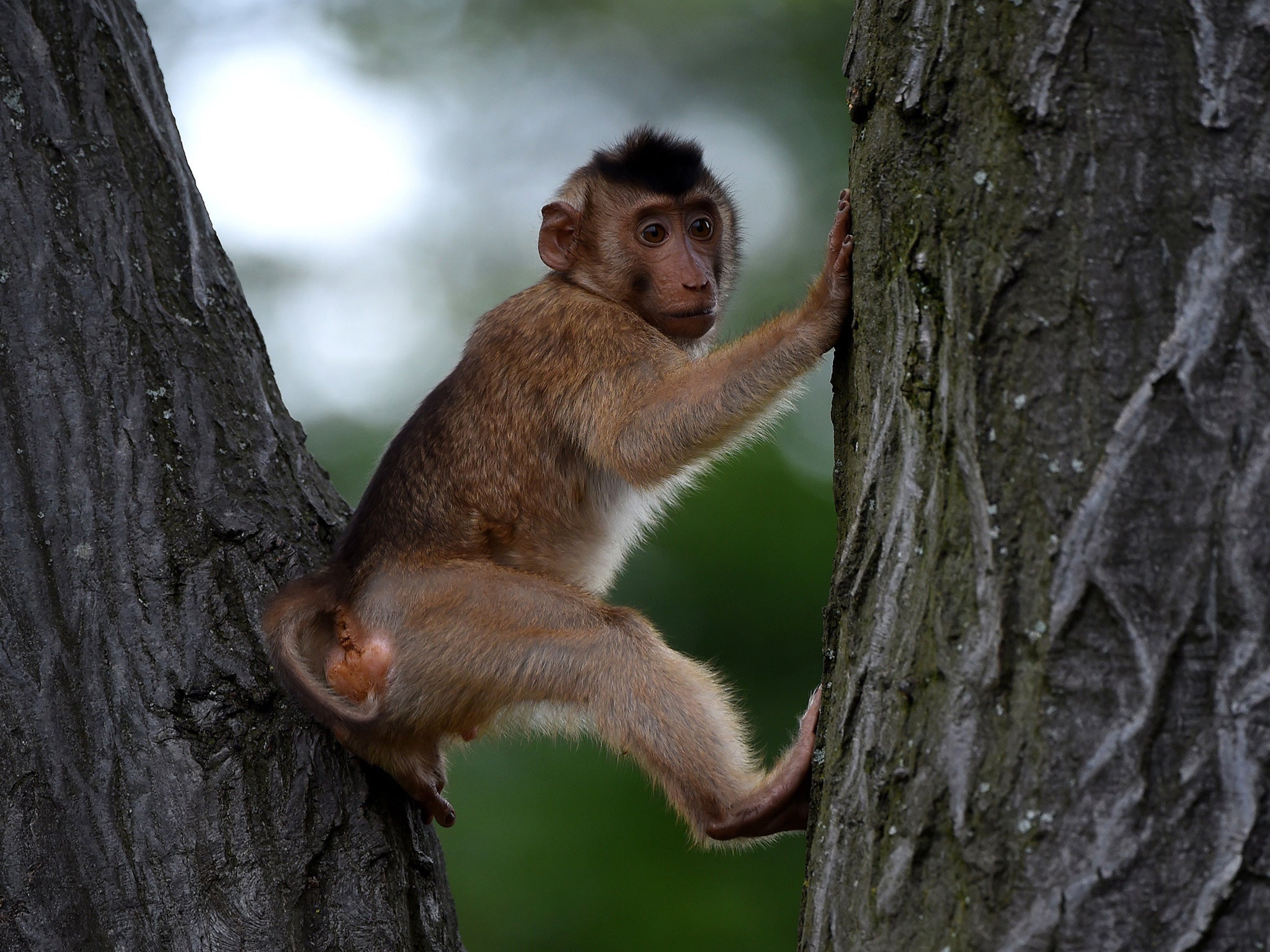Leashed monkeys forced to pick coconuts in Thailand
PIgtailed macaques are able to pick around 1,600 coconuts a day, compared to around 80 for a human

Your support helps us to tell the story
From reproductive rights to climate change to Big Tech, The Independent is on the ground when the story is developing. Whether it's investigating the financials of Elon Musk's pro-Trump PAC or producing our latest documentary, 'The A Word', which shines a light on the American women fighting for reproductive rights, we know how important it is to parse out the facts from the messaging.
At such a critical moment in US history, we need reporters on the ground. Your donation allows us to keep sending journalists to speak to both sides of the story.
The Independent is trusted by Americans across the entire political spectrum. And unlike many other quality news outlets, we choose not to lock Americans out of our reporting and analysis with paywalls. We believe quality journalism should be available to everyone, paid for by those who can afford it.
Your support makes all the difference.If a creature is smart enough to pick coconuts, is it fair to make him? This is the question at the heart of a controversy over pigtailed macaques in Thailand that excel at picking coconuts loved by Western consumers — but do so on leashes.
“What I find most distressing is that they take them from wild, keep them tethered and keep them that way their whole life,” Marji Beach, education director of the California farm sanctuary Animal Place, told NPR. “Monkeys should stay in the wild.”
Leaving the deft-fingered macaques in the wild might deal quite the blow to the coconut biz. As NPR noted, males can harvest an average of 1,600 coconuts per day, while females can harvest 600. Compared with their less-evolved brethren, humans are real apes at this game, bringing home just 80 per day.
“It would be difficult to find a coconut product made in Thailand that wasn’t picked by a monkey,” Arjen Schroevers of the Monkey Training School in Surat Thani, Thailand, said.
On its Web site, the school, founded by Somporn Saekhow in 1957, bills itself as a monkey university — not a workhouse.
“As his parents were coconut farmers, Somporn experienced the traditional use of monkeys for the harvest of coconuts,” the Web site reads. “These monkeys were often beaten by their owners when they didn’t perform as expected (e.g. when they left ripe coconuts on the tree). This gave him the idea to teach monkeys in a better way. His Buddhist teacher encouraged him to teach monkeys positively, without the use of force or violence. In time, his school became locally famous, and the largest monkey school of all of southern Thailand.”
Indeed, in a documentary about the school shot in the 1990s, MTS seems like a bit of a monkey paradise. Saekhow handles a monkey less like a taskmaster than a father:
“Do it quickly, son, and when we finish this, you can go home,” he says to a charge, speaking of the need to be kind. He adds: “The monkeys are innocent. If we beat them, it’s a sin.”
But, then again, there’s that leash — an obvious sign that monkeys may not be into the monkey business set before them by management. And while Saekhow may be enlightened, other schools may be less so. One described by the Bangkok Post last month talked up monkeys, more or less, non-unionized slave laborers.
“[Monkeys are] strong, enjoy climbing, are not afraid of heights, do not complain, do not call for higher wages … and are not corrupt,” the school’s Web site read. “They do not require social security and accident insurance. Monkeys are therefore considered a ‘living machine’ that is very valuable for coconut farmers.”
Perhaps this is the attitude that led Animal Place to contact dozens of coconut companies to quiz them on how they treated their monkeys.
“In some regions of the world, pig-tailed macaques are intentionally bred and trained – often with punishment – to harvest coconuts,” the farm’s Web site read. “The monkeys are always tethered to their ‘handler’ and are not permitted to eat the coconuts they collect. No statistics exist detailing exactly how many monkeys are bred and used for this purpose.”
Monkey mistreatment has also inspired debate on activist Web sites such as All American Vegan.
“Unfortunately, much of the reporting you will find on this issue approaches it from a disturbing ‘entertainment’ angle in which the subjugation and forced labor of primates is treated as a curious, amusing oddity rather what it really is: exploitation of highly intelligent individuals,” an article on the Web site read. “Instead of living fulfilling, autonomous lives in deference to their natural instincts and will—lives that would include social interaction with others of their kind, mating, raising young, moving about freely and resting whenever they choose—these monkeys spend their lives in endless toil and forced obedience to the will of humans.”
So, as an animal rights organization in the United States sues to protect the simian copyright of macaques taking “monkey selfies,” can the poor coconut-pickers be far behind?
Whether or not they prevail in court, the monkeys may be taking matters into their own hands — as PETA noted back in 2009.
“A monkey in Thailand — fed up with performing the thankless task of climbing coconut trees to retrieve fruit for his owner to sell — apparently launched a coconut at the man’s head, killing him instantly,” the organization’s Web site read. “Did we mention that payback is hell?”
Washington Post
Join our commenting forum
Join thought-provoking conversations, follow other Independent readers and see their replies
0Comments